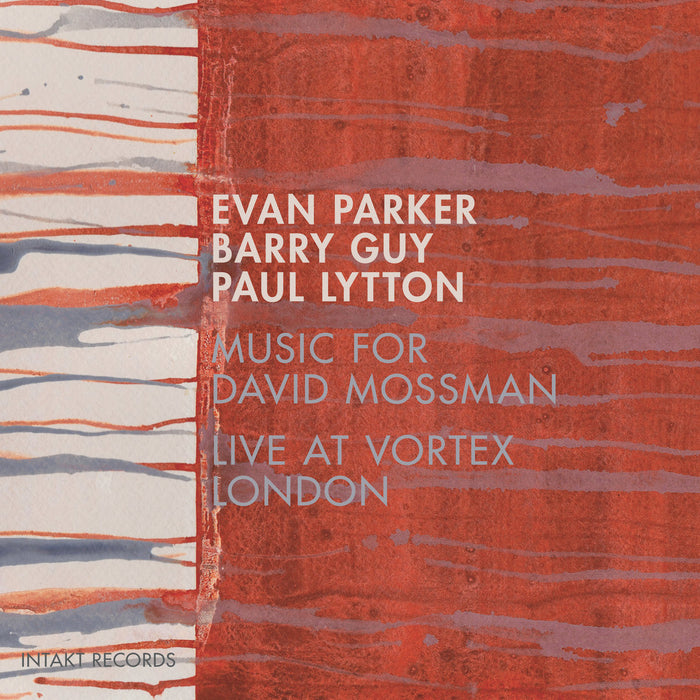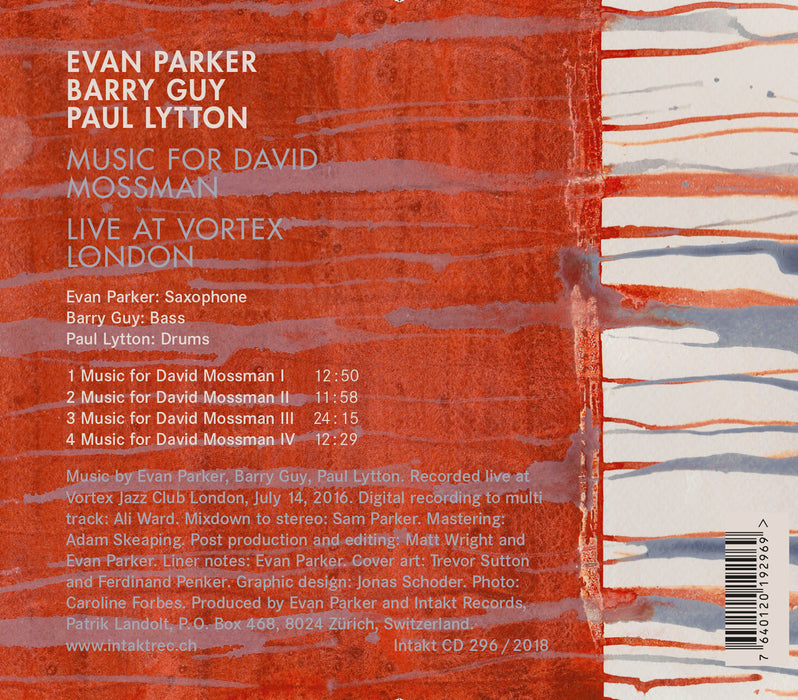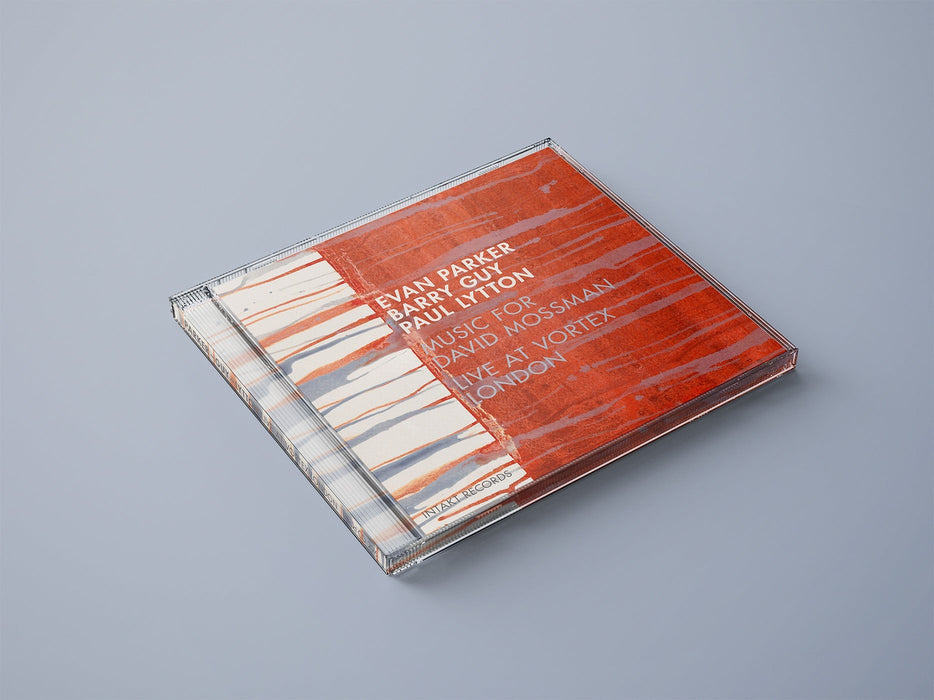


296: EVAN PARKER – BARRY GUY – PAUL LYTTON. Music For David Mossman - Live At Vortex London
Intakt Recording #296/ 2018
Evan Parker: Saxophone
Barry Guy: Bass
Paul Lytton: Drums
More Info
Die drei improvisatorischen Urgesteine Evan Parker, Bary Guy und Paul Lytton haben ihre eigenen epochalen Individualstile entwickelt. Nun legen die seit vielen Jahren persönlichen und musikalischen Freunde die neueste ihrer gemeinsamen Aufnahmen vor - ein Höhepunkt einer Reihe, die 1980 mit der schon seit Jahren vergriffenen LP 'Tracks' begann. In ihren kraftvollen Improvisationen zeigt sich ein Trio der Innovation, der Bewahrung und steten Erneuerung der grossen Errungenschaft des freien Jazz. Evan Parker schreibt in den Liner Notes: "Kollektive freie Improvisation ist der utopische Zustand, den man in diesem anderen «kleinen Leben» erreicht, wie der verstorbene John Stevens den geistigen Raum des Musizierens nannte, der entsteht, wenn gleichgesinnte Musiker («birds of a feather») frei miteinander spielen. Paul Lytton und ich trafen uns zum ersten Mal 1967 auf einem Musikfestival in einem Park in Birmingham, wo ich im Duo mit John spielte, Paul in einer Jazz-Bigband und Peter Greens Fleetwood Mac die «Hauptattraktion» des Programms war (wie es damals hiess). In den nächsten Jahren spielten wir alle zusammen in verschiedenen Kombinationen und Konstellationen, unter anderem in Barras London Jazz Composers Orchestra und als Parker-Lytton-Duo. Seit 1980 spielen wir als Parker -Guy-Lytton-Trio. "*«
Album Credits
Cover art: Trevor Sutton and Ferdinand Penker
Graphic design: Jonas Schoder
Liner notes: Evan Parker
Photo: Caroline Forbes
Music by Evan Parker, Barry Guy, Paul Lytton. Recorded live at Vortex Jazz Club London, July 14, 2016. Digital recording to multi track: Ali Ward. Mixdown to stereo: Sam Parker. Post production and editing: Matt Wright and Evan Parker. Mastering: Adam Skeaping. Produced by Evan Parker and Intakt Records, Patrik Landolt.
Dans les notes qu'il signe pour ce nouvel enregistrement du trio qu'il forme avec Barry Guy et Paul Lytton, Evan Parker rend hommage à John Stevens avant de revenir sur sa longue collaboration avec une paire rythmique d'exception: << J'ai rencontré Paul Lytton pour la première fois en 1967 à l'occasion d'un festival de musique qui se tenait dans un parc de Birmingham où je jouais en duo avec John... >>
Compagnons du London Jazz Composers Orchestra de Barry Guy, Parker et Lytton ont joué en duo puis, dès 1980, en trio avec le contrebassiste. Si Tracks, le premier enregistrement de l'association, a paru en 1983 sur Incus, sous œuvre a été publiée par une pléiade de labels (Emanem, Leo, Marge, Clean Feed, CIMP et bien sûr Maya et psi) que vient aujourd'**** grossir Intakt.
Ce sont-là deux sets enregistrés le 14 juillet 2016 au Vortex de Londres et quatre pièces que le trio dédie au fondateur du club, David Mossman. Solos, duos, trios: les combinaisons changent et, avec elles, les directions de cette nouvelle et saisissante épreuve d'improvisation libre. Et puisque les musiciens, en plus d'être capables, sont depuis longtemps intimes, ils adaptent leurs discours personnels sans jamais faillir: ce sont Guy et Lytton qui s'expriment avec une même retenue (II), Parker qui invente en frénétique à la suite de Lytton (III), Guy qui rejoint Parker au son d'un archet fragile (IV)... Quant à la première pièce du disque, sa mise en place augurait une heure fabuleuse: et c'est ce qui est arrivé.
Regardless of one’s field of interest or study, there are texts that are occasionally, if not regularly revisited, either to refresh the conviction that they are important, or extract a potentially phosphorescent quote. When it comes to improvised music, Derek Bailey’s Improvisation: its nature and practice in music is central. The iconic guitarist’s exacting perspective set the bar for discourse about improvised music, while his softly prodding approach as an interviewer yielded gem-like statements from improvisers of disparate stripes. Having read the book several times since the early 1980s, there are phrases and passages from it that come to mind, at times vaguely, when listening or writing; yet, they never fail to ring true when reread. The most recent instance involves an intriguing quote from Wadada Leo Smith about what he called the independent center of an improvisation, which Bailey referenced in regards to the limited lifespan of most improvising groups. Here is the relevant passage as printed in the first version of Bailey’s book, published by Moorland in 1980:
“[T]he played-out improvising group suffers a loss of what Leo Smith describes as the ‘independent centre’ of the improvisation; that part of the music which exists independently of the performers, intentions and seems to be created by a sort of second-degree or sub-conscious relationship between the players. The undefinables get defined or disappear.” [Page 145]
What stood out, grammatically, was a disruptive, even ill-placed comma between “performers” and “intentions.” Graphically, it suggested a fallen apostrophe, which would have sharpened the sentence. Perhaps a correction in the second version would allow the passage to be quoted without a bracketed phrase masking the comma, or the more stinging option of leaving the blemish and injecting [sic]. Surprisingly, the chapter from which the passage concluded its lead paragraph – Limits and Freedom I – was not listed as such in the second version’s table of contents; apparently, the two Limits and Freedom chapters from the first version were compressed into one for the second version of the book. Certainly, this critical passage had been retained, for it supported one of Bailey’s core positions – that ad hoc ensembles were indicated for improvised music.
However, the passage was gone. Because the second version of Improvisation included a name index – the absence of one in the first version being a recurring frustration – a quick check was possible to see if the passage centered on Smith’s phrase had simply been moved elsewhere in the book. It hadn’t – it had been expunged from this vital text. This spurred the curiosity to discern what else had been cut. A comparably important passage beginning on the very next page had also been removed, the implications of which were more far reaching.
The passage pivots on Bailey’s articulation of the “semi-ad-hoc” ensemble, “[a] situation in which the players, although familiar with each other’s playing, manage to avoid permanent commitments ... This, it seems to me, might be the ideal approach to free improvisation ... [allowing groups] to avoid the usual two or three years life and have found a way of apparently endless survival. Evan Parker gave me his account of why his duo with Paul Lytton, formed in 1969, has survived.
“One of the reasons could be that the actual playing we do is intermittent. There are periods when we play very often but there have always been periods of not playing. And neither of us limit our activities to the group. We play in other situations with other people. The thing is to maintain some sort of balance between the positive aspects of the relationship and the possible repetitive ones. Also, there’s a good common bond of friendship between Paul and I which perhaps enables us to overlook periods of non-productive effort in the interest of sustaining the social side of the relationship.
“I put it to Evan Parker that the changes that come over long-lasting groups [results] in the improvisation more and more resembling idiomatic improvisation. Certain elements become fixed: – identities, relationships, vocabulary often, and the improvisation of other elements is carried out in relation to these fixed points. He thought this development useful: – [sic; another strange use of punctuation presumably in the service of clarity]
“Things that are established as known between yourselves probably form as useful a context for the evolution of something new as anything. But the inter-personal relationships should only form the basis of working, they shouldn’t actually define the music too clearly, which they often do.
“Evan Parker also said:
“In practice the closest I would get to a laboratory situation is working with the people I know best. It can make a useful change to be dropped into a slightly shocking situation that you’ve never been in before. It can produce a different kind of response, a different kind of reaction...
Passant par maints cols et brèches, le trio Evan Parker, Barry Guy et Paul Lytton improvise sans relâche et comme au premier jour. Certes, il ne s'agit plus de défricher le terrain, de découvrir d'autres territoires: c'est fait depuis longtemps. Il ne s'agit pas, non plus, d'entretenir une science aussi forte et originale soit-elle. Il s'agit de circuler de l'un à l'autre, de resserrer le cercle, d'emporter l'un vers l'autre et de retrouver intact ce trio à nul autre pareil. Car le temps passe et tout est à recommencer- redécouvrir: le souffle continu (au ténor!) d'Evan Parker de plus en plus large, de plus en plus ouvert; les tambours de Paul Lytton toujours plus fins et toujours aussi précis; la contrebasse mille-pattes de Barry Guy fourmillant et déployant ses ailes (des ailes ou des pattes: faudrait savoir monsieur le chroniqueur!) en autant de flèches hirsutes.
Et quand tous trois (part 3) utilisent les mêmes canaux, battissent les mêmes et solides ouvrages, c'est la fraternité qui parle. Fraternité et beauté ainsi mêlées en cette soirée du 14 juillet 2106 (soit une prise pacifique du Vortex) et offerte au fondateur de ce même Vortex, Monsieur David Mossman. Immanquable!
BEST OF 2018
LIVE ALBUMS
PARKER/BARRY GUY/PAUL LYTTON
Music for David Mossman
(Live at Vortex London)
A stunning home game of the three pioneers of European free music. Parker, Guy and Lytton in top form and an honourable tribute to the recently deceased founder of the Vortex Club, David Mossman.
https://londonjazznews.com/2018/12/29/ljn-year-end-lists-3-recorded-memory-of-the-year-2018/
Over 35 years and counting. It's fair to say that the British trio of saxophonist Evan Parker, bassist Barry Guy and drummer Paul Lytton constitutes one of the longer-lived units in the free improvised realm, a domain often distinguished by its tendency towards ad hoc groupings. So, with a discography over two score in size, you can be sure that when a new release arrives it documents something worth hearing.
And that is indeed the case with Music For David Mossman, dedicated to the founder of London's Vortex Jazz Club where the music was recorded in concert, which hints at a more serene, more introspective aspect of what can still be a ferociously focused outpouring. Maybe that's at least partly a consequence of the subsequent editing and programming undertaken by Parker, to construct the four pieces presented here from two live sets.
Even though they now only come together a few times each year, the connections between the three men have never seemed stronger. That's obvious straight from the off in "I," which begins with a wonderful duet between Guy and Lytton. Although out of the blocks gingerly, once the bassist echoes Lytton's tappy patter, it results in the drummer ramping up the emphasis, and the interplay soars. But if that suggests an impending all out assault, it's not to be. In one of the many mercurial transmutations which pepper this disc, the impetus abruptly ceases and, when Parker joins Guy's glacial resonances, it's in subdued, even melancholy, mood.
Notwithstanding such switchbacks, the default remains rapid-fire interaction notable for the density of information imparted at pace, due not only to speed of thought but also speed of execution. Each is a groundbreaking and influential master of his instrument. Guy's unaccompanied introduction to "II" draws on some of his innovations, as he extracts wobbling metallic overtones through a rod threaded between his strings, alternated with sharp plucks and ringing twangs, with all the elements made audible through judicious use of a volume pedal.
Lytton enjoys a brace of turns in the spotlight on the lengthy "III," one showing his proficiency on the conventional sonorities from bass drum, cymbals and snare, but the other made up of simultaneous rustling, rattling and scraping noises from the array of percussive implements which supplement his kit. For his part Parker not only indulges in the expected prolonged passages of circular breathing, generating a querulous falsetto to crown his burnished serrated lines, but also edges within shouting distance of lyricism on more than one occasion. But at the start of "IV" that reflective mode becomes prominent once more, as he initially holds back from leaping into another note-filled extravaganza.
Put simply, it's a dazzling account from a superlative threesome revealing a hitherto underappreciated emotional dimension to the richly-detailed tapestry they weave.
https://www.allaboutjazz.com/music-for-david-mossman-evan-parker-intakt-records-review-by-john-sharpe
Le magie del trio
Il giorno dell'incisione del primo od che trattiamo, Triad (Long Song Records), ad opera di Satoko Fujii, Joe Fonda e Gianni Mimmo, Fujii compiva 60 anni: la signora del pianoforte jazz d'avanguardia giapponese ha poi dichiarato di aver lavorato una vita, per arrivare a incidere con serenità musica improvvisata di questa caratura. Con il sax soprano inimitabile di Mimmo, erede delle spericolate divagazioni di Lacy, e il contrabbasso pensoso di Fonda alternato a un altro strumento che maneggia da maestro, il flauto traverso. Grande musica, dunque. E belle note in improvvisazione le trovate anche in Live Constructions (Slam Records), ad opera di un altro trio che comprende Daniel Carter a tromba e sassofono tenore, Hilliard Greene al contrabbasso, David Haney al piano: anche qui i tre non avevano mai suonato assieme prima, e il miracolo accade. Fiamme e incendio di impro music con gli scafatissimi Evan Parker, Barry Guy e Paul Lytton in Live at Vortex, sottotitolo Music for David Mossman: un mecenate e mentore grazie al quale queste note coraggiose e poco allineate possono ancora risuonare in spazi pubblici.
Dans un domaine pourtant étroit et pointu – la free music – qu’ils exploitent ensemble depuis 1980, Evan Parker (saxophone), Barry Guy (contrebasse) et Paul Lytton (batterie) arrivent encore à se renouveler, grâce notamment à une maîtrise absolue, une conscience aiguë de leur travail, et une écoute attentive mais sans concession. Les improvisations collectives se succèdent, avec tantôt la mise en avant de l’un ou l’autre ; notons en particulier le discours inouï d’Evan Parker – il ne joue que du ténor – dont le jeu a de plus en plus d ’envergure. Cette construction spontanée, amenée par une logique et un vrai plaisir des musiciens, conduit à une puissance de jeu phénoménale.
Ce disque a été réalisé à Londres, au club Vortex, là où ils avaient enregistré pour la première fois ensemble, et ils l’ont dédié à David Mossman, le défunt patron du club. « Music for David Mossman »
https://www.culturejazz.fr/spip.php?article3360
De titel verwijst naar de grondlegger van de Londense Vortex jazzclub, waar iedereen die past in het circuit van de collectieve improvisatie zijn gading vindt. Dit is dan ook geen toegankelijke muziek: het is jazz pur sang, de allerindividueelste expressie in het moment. Verwacht ratelende drums, bruitages, een gemartelde sax en puntige basmeppen. De cd komt over als één brok gedreven energie, en de kracht waarmee deze 3 muzikanten elkaar bestuiven grenst aan het ongelofelijke: naarmate de nummers vorderen neemt de dynamiek exponentieel toe. Dat soort vuurwerk produceren ze al sinds 1967. Een luistersessie vraagt een open en getraind oor. Maar wie zich laat onderdompelen wordt beloond met een uur durende reis doorheen klankwerelden die echt niet alledaags zijn. Hoed af voor zoveel bruusk maar harmonisch geweld!
https://jazzandmo.be/music-david-mossman-live-vortex-london
The title's dedicatee, David Mossman, was the founder of the Vortex live music venue in east London, which, as Evan Parker points out in his liner note, “[for] over 30 odd years has become an essential part of London's musical life”. But, while we're honouring longstanding musical institutions, this trio itself is surely a contender. Their new offering – recorded at the Vortex, naturally – is the latest in a series that began in 1980 with the now out-of-print Tracks. Their shared history goes back a lot further than that. Parker's friendship with drummer Paul Lytton began more than half a century ago in 1967, while Parker and bassist Barry Guy were working together as part of Spontaneous Music Ensemble as early as 1966. Unsurprising, then, that the three of them trade in a dense, information-rich music through which they seem to achieve the holy grail of free-improvisation: the group mind. In a sense, it feels like those early experiences with SME, trying hard to navigate a path away from American free-jazz, have come full circle, as the three of them dig with a bullish, muscular energy and Parker's tenor sounding gruffer than ever. Make way for the originals.
https://www.jazzwise.com/review/evan-parker-barry-guy-paul-lytton-music-for-david-mossman-live-at-vortex-london










